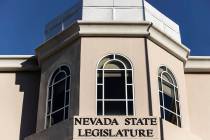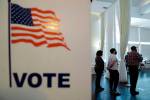Nevada’s Education Savings Accounts imperil public education
Last month, the Annie E. Casey Foundation ranked Nevada's public education system 50th in the nation. This is no surprise. Our state has been at the bottom in education for at least a decade. According to the most recent Nation's Report Card, Nevada's school funding system is the nation's worst.
The Nevada Legislature and Gov. Brian Sandoval this year took steps that offered a ray of hope that our schools would get better, appropriating an increase in education funding after more than a decade of flat or reduced budgets. Some of the new funds are targeted to those students and schools most in need. These investments, if continued and expanded, could bring about the renaissance in public education our children, communities and state so desperately need.
Unfortunately, the Legislature also enacted Senate Bill 302, creating Education Savings Accounts, or ESAs. This new program is likely to undermine any progress before it has even begun. Similar programs have been tried elsewhere on a limited scale; none has a clear track record of success in improving education. By contrast, Nevada's ESAs have very few conditions, and access will be nearly universal. This program will further overwhelm a public school system still recovering from drastic budget cuts triggered by the Great Recession.
ESAs will be paid for by transfers of between $5,100 and $5,700 in per-pupil education funding for all children who leave their public school. To be eligible, a child need only attend the public school full- or part-time for 100 school days before leaving the school. Public funds deposited in an ESA can be used to pay for a wide variety of private education services, including private school tuition, online schooling, tutoring, transportation and any expense related to home-based education.
The ACLU of Nevada last week filed a lawsuit in state District Court arguing that the ESA program is too expansive, because it will allow private religious schools to receive unlimited amounts of taxpayer funds to use for religious education. In addition, ESAs are highly problematic because of impacts on an already debilitated public education system. If parents of the 20,000 children currently in private schools take advantage of ESAs, the result will be a decrease of at least $100 million to public school budgets. This will undermine the ability of public schools to operate effectively for all students and will wreak havoc on school district budgeting and planning.
Because the law has no income limit, the most affluent families, even millionaires and billionaires, can obtain the same allotment of $5,100 to $5,700 per child in taxpayer education dollars — taken from the public schools — to underwrite their child's private education.
Almost all of Nevada's struggling public schools are in inner cities, where only a handful of private schools are located. There are only half a dozen or so private schools in Clark County where $5,000 would cover the full cost of private school tuition, and almost all of these schools require religious instruction. More affluent parents, better able to pay additional tuition and costs of transportation, will benefit most. Those least able to take advantage will be Nevada's substantial population of at-risk students, English language learners and students with disabilities. Public schools will have to manage the education of a more racially segregated and less affluent student population with fewer resources. UCLA professor Gary Orfield's research has shown consistently that racial and socioeconomic segregation is a deeply important cause of educational inequality.
At public workshops on ESAs held by state Treasurer Dan Schwartz, the most vocal supporters were parents of children currently enrolled in private schools. Their main complaint: They would have to put their child in a public school for 100 days to qualify for an account. Only a handful of parents from our minority communities were present at either workshop.
All Nevadans agree that we must improve our public schools. Nevadans who care about education as a public good must take a long, hard look at this new law. ESAs imperil our ability to provide high-quality education for all Nevada children. Even worse, this law puts our public schools and their students at risk of continuing failure, to the detriment of our collective future.
Sylvia R. Lazos is the policy director of Educate Nevada Now!























